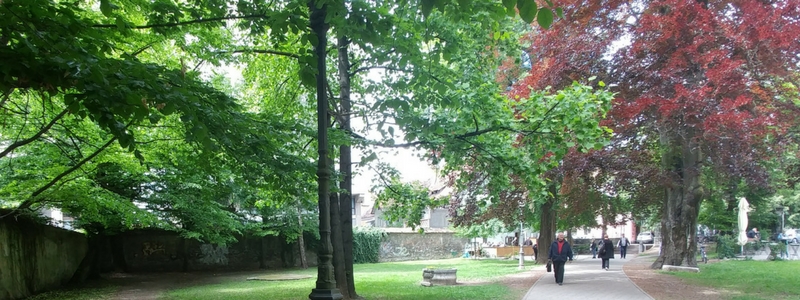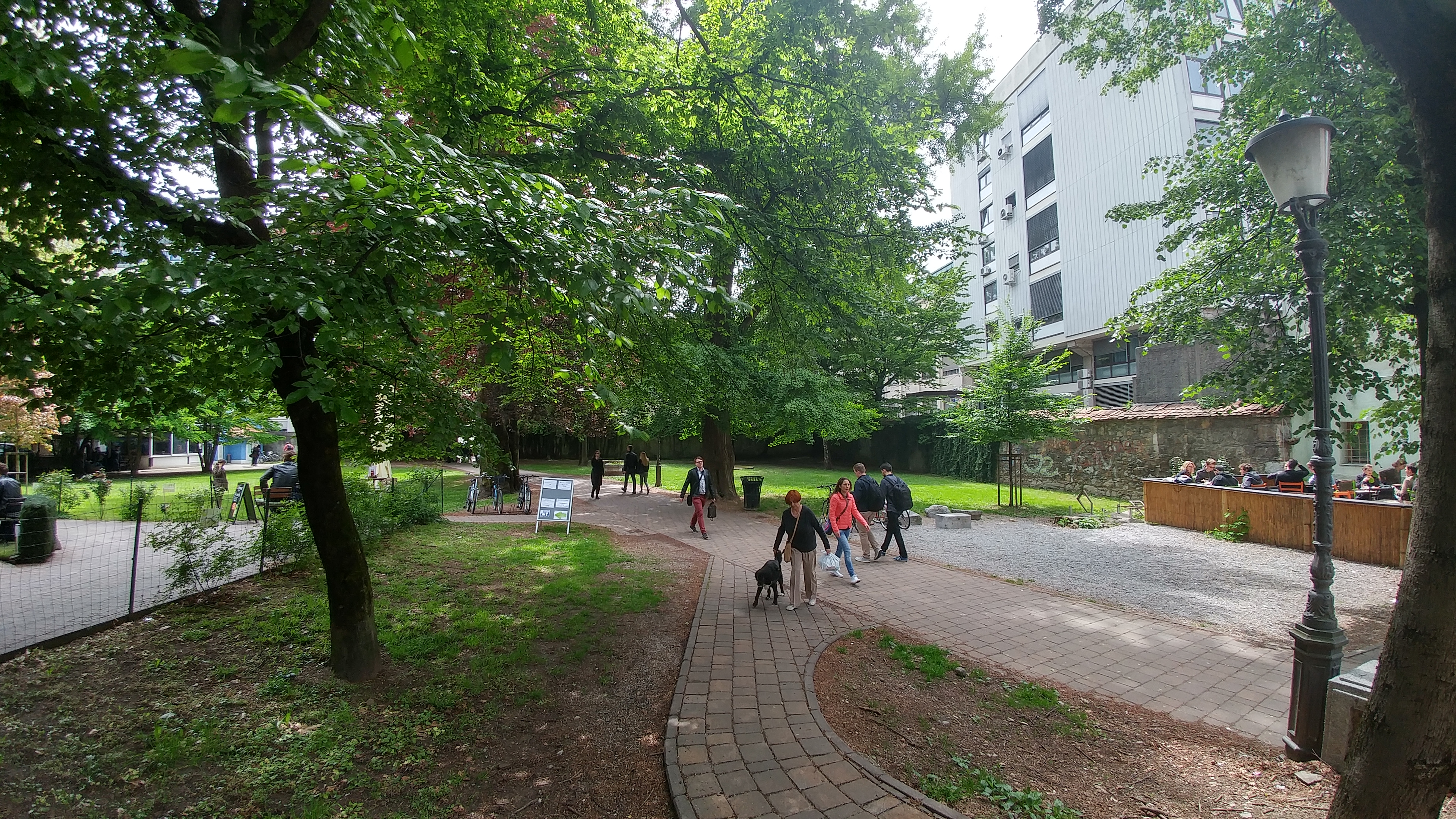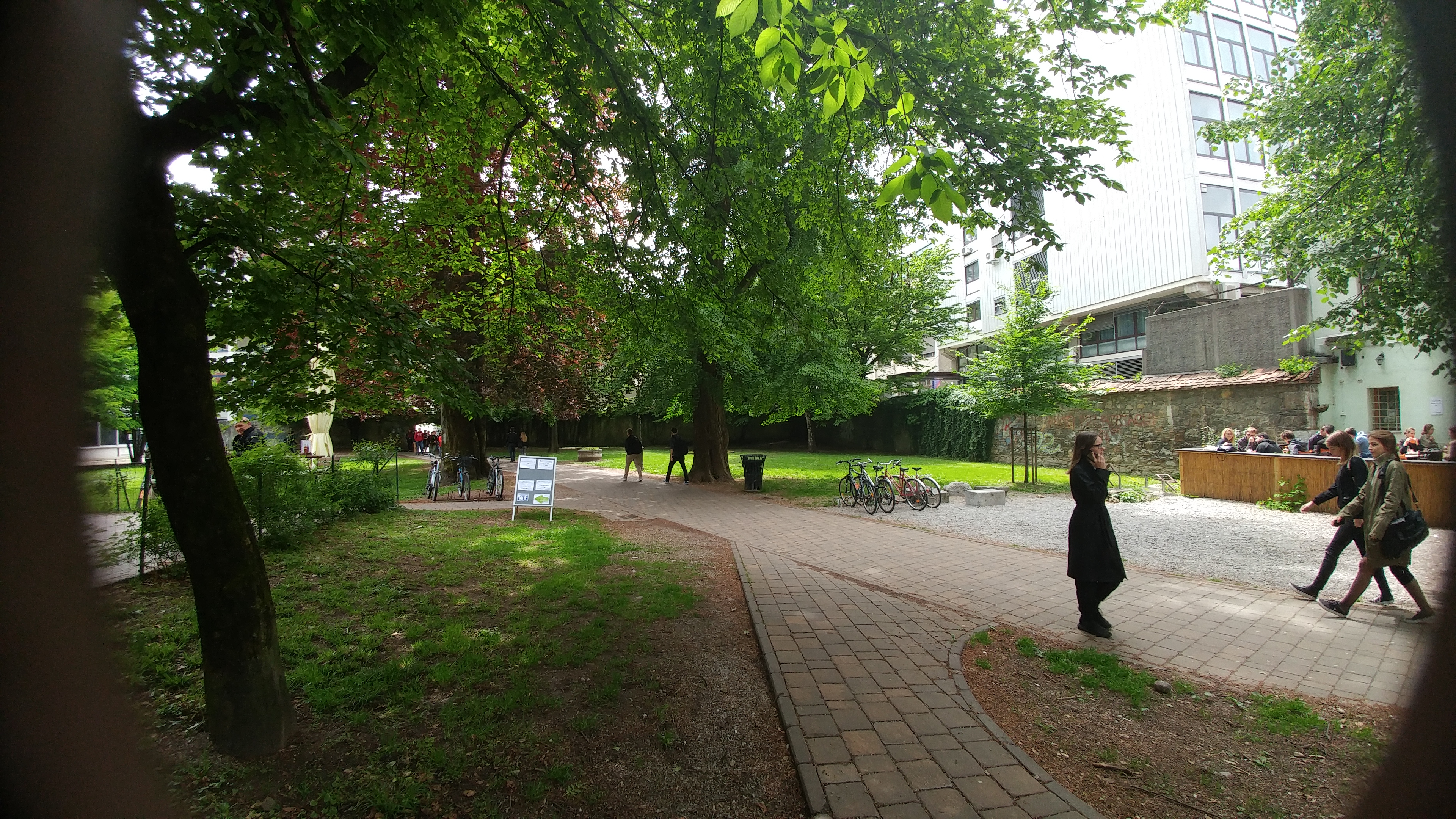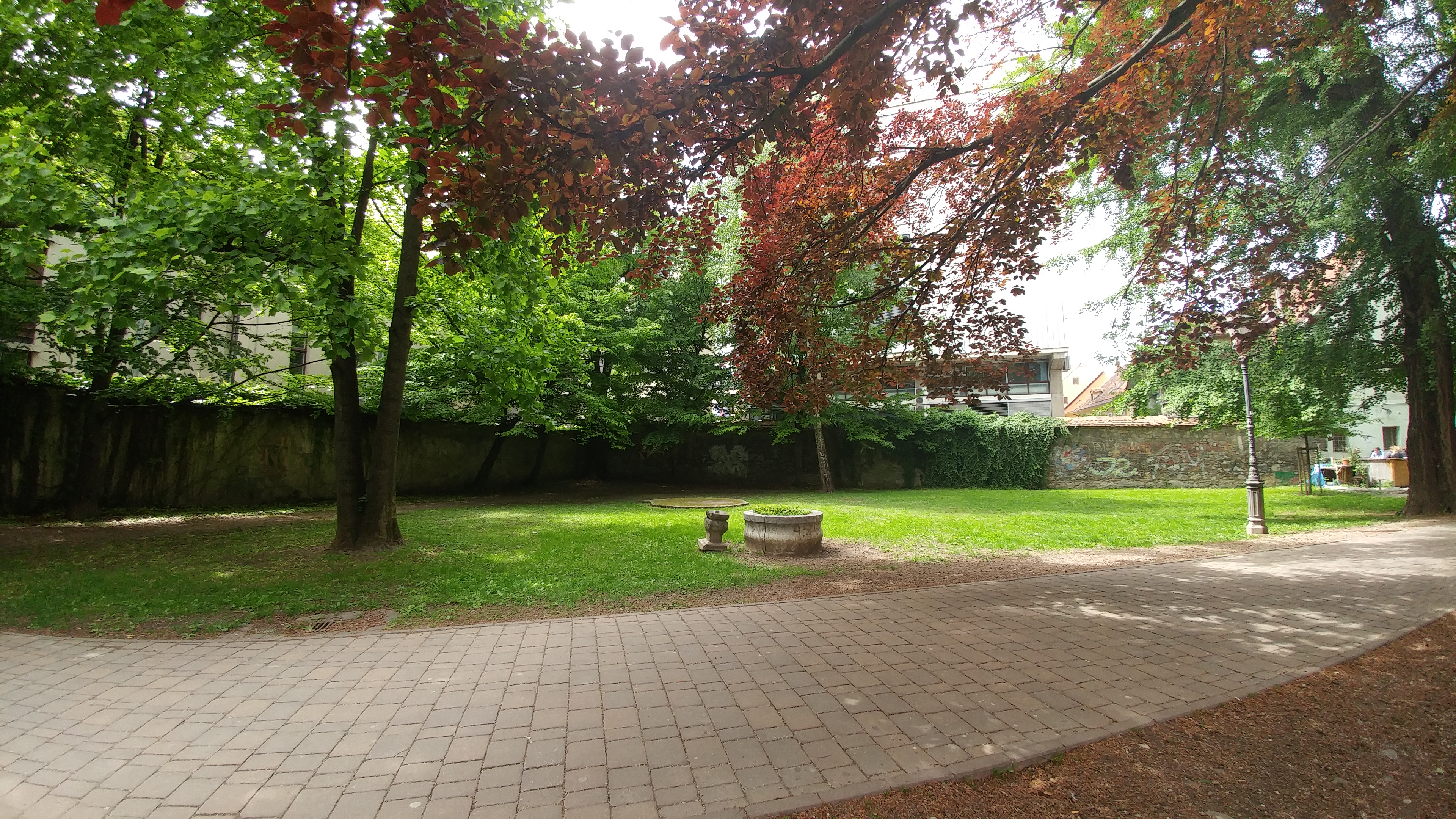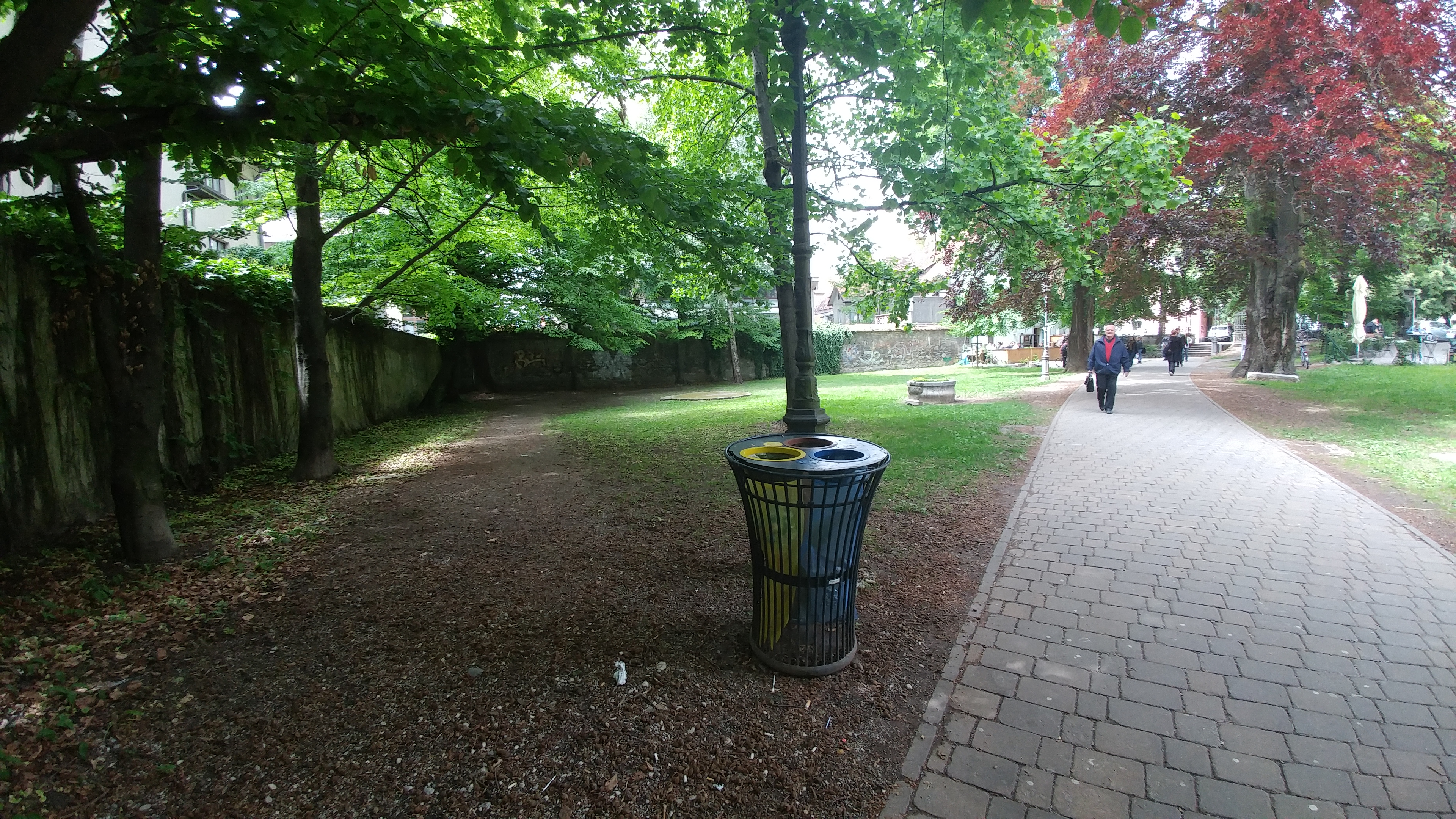A green oasis in urban Ljubljana, the garden named after composer Anton Foerster is located on the north side of Rimska Street, next to the building (13 Rimska Street) where the composer lived. Laid out following a design from 1928, the garden lies in the immediate vicinity of the Musicology Department of the Faculty of Arts and has been planted with various selected species of trees (plane, horse chestnut, beech and gingko).
Anton Foerster
A naturalised Slovenian of Czech descent and a key figure of the Slovenian national revival, Anton Foerster (1837–1926) made a profound impression on the Slovenian musical landscape as one the most prominent Romantic composers. A church musician, theoretician, organist, composer, editor and teacher, whose artistic output displays a marked duality of sacred and secular works, Foerster made an important contribution to Slovenian cultural heritage in the second half of the nineteenth century. One of his greatest musical gifts to the Slovenian nation was Gorenjski slavček (The Upper-Carniolan Nightingale), the first true Slovenian national opera, which, displaying significant influences of folk songs, reveals the wider context of the social and political tendencies of the time, which cultivated a consciously national operatic idiom, known as national operas. These works expressed the emancipatory endeavours of individual peoples to establish sovereign national states. Besides being a national composer as an embodiment and channel for the Slovenian people’s secular musical style, Foerster is also an important representative of the ecclesiastical (German) Caecilian movement in Slovenia.
Foerster was born in Osenice, Bohemia, into a family with a strong musical tradition, and the young Foerster thus received his first music education from his father. After graduation, in 1858, Foerster entered the Cistercian Monastery in Vyšší Brod and devoted himself to composition. After some time, he moved to Prague, where he obtained a degree in law and made the acquaintance of several influential composers, including Karel Bendl, and Bedřich Smetana, who appointed Foerster as a piano teacher in his institute and encouraged him in his aspirations as a composer.
While serving as a cathedral organist and regens chori in the Croatian town of Senj, Foerster introduced a reform of church music practice and engaged in composing with increased vigour. This period saw the genesis of his Glagolska maša (Glagolitic Mass) as well as various secular works, including compositions based on poems by Croatian writers.
In 1867, Foerster moved to Ljubljana, where he joined the Reading Society, a movement aimed at raising and fostering Slovenian national awareness that emerged in the early 1860s, first in Trieste, Maribor and Ljubljana. The Reading Societies strove towards shaping a national style in musical and literary creativity by means of promoting nationally conscious artistic views with an emphasis on the use of the Slovenian language. The Reading Society movement therefore primarily fostered national choral music, (singspiel) operettas and plays in an effort to sharpen the differences between the German and Slovenian cultural worlds.
In Ljubljana, Foerster was influential as the choirmaster of the Reading Society, and founded its choral school, to which end he also wrote a vocal training manual, a pioneering theoretical work that was instrumental in laying the foundations for Slovenian music terminology. He strove to raise the programme standards of evening concert performances by advocating the inclusion of more pieces by contemporary Slovenian composers as well as chamber works by Beethoven, Schumann and Mozart, in addition to simpler musical expressions of the Slovenian national spirit. In 1870, Foerster distanced himself from the more conservative musical tendencies of the Reading Society, when he became an associate of the German Dramatic Society, the Glasbena matica Music Society, and worked as organist and regens chori of the Ljubljana Cathedral. Enjoying institutional support, Foerster invested his efforts into gradually reforming the ecclesiastical music style by following the examples of the German Caecilian movement, whose Catholic Church music ideals were Gregorian chant, monophony and Renaissance polyphony. In pursuing these reforms, little attention was paid to cultivating Slovenian, nor was proper regard given to contemporary music.
Undertaking to embody a Slovenian national dimension in secular music, Foerster adapted euphonious folk songs and inscribed them into his own musical style, saturated with Romanticism. A Slovenian national music monument, the opera Gorenjski slavček, originally an operetta written in 1872 and submitted to the Dramatic Society’s call for original scores, displays both of the above-mentioned musical tendencies. The manuscript received the highest scores from the three major Czech music authorities in Prague, who comprised the jury: Smetana wrote that the operetta displays “fresh melodiousness, inventiveness, a thorough knowledge of harmony and skilful instrumentation”, while music critic and editor Ljudevit Prochazka was of the opinion that “the composer gave due consideration both to the national specifics and practical execution”, and together with composer Karel Bendl awarded the first prize to the work.
With his notable musical style and prolific output, reflecting a great diversity of genres and encompassing over four hundred compositions ranging from choral works and lieder, chamber, piano and orchestral works, Foerster, alongside his contemporaries Fran Gerbič and Benjamin Ipavec, was one of the preeminent figures of the most prominent period of Slovenian Romanticism, and elevated the status of Slovenian music creativity, asserting it within the composed music tradition of the Habsburg Hereditary Lands.
Maia Juvanc
